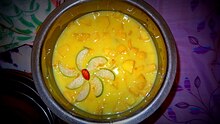

This article needs additional citations for verification. Please help improve this articlebyadding citations to reliable sources. Unsourced material may be challenged and removed.
Find sources: "Aamras" – news · newspapers · books · scholar · JSTOR (April 2012) (Learn how and when to remove this message) |

Aamras from India
| |
| Course | sauce |
|---|---|
| Place of origin | Indian subcontinent |
| Associated cuisine | India, Bangladesh, Pakistan |
| Serving temperature | Chilled |
| Main ingredients | Mango, milk |

Aamras (also known as amras) is a sweet dish in the cuisine of the Indian subcontinent made from the pulp of the mango fruit. The pulp of a ripe mango is extracted, usually by hand, and is eaten together with poorisorchapatis, Indian breads. Sometimes ghee and milk are added to the pulp to enhance its flavour. Sugar may be added for sweetness. It is often eaten at celebrations and weddings with cardamon and chopped fruits.
A regional version of aamras is a popular dessert in Marathi, Rajasthani cuisine and Marwari and Gujarati homes, especially during festivities.
Originally a traditional dish from Gujarat, it is very popular there.
Since the fruit is seasonal, being harvested at the end of summer, the need to preserve the fruit in the form of pulp has given rise to a moderately large mango-processing industry.
The word "aamras" is derived from the Sanskrit words āmra (Sanskrit: आम्र; lit. 'mango') and rasa (Sanskrit: रस; lit. 'juice'), so the literal meaning is "mango juice".
Panhe is a traditional summertime drink in Maharashtra, a sweet drink made with the pulp of boiled raw mangoes mixed with half the amount of sugar and diluted with water. The drink helps in tolerating the heat.
Aamras is also a traditional Gujarati dish (called કેરીનો રસ (kerī-no ras)). It consists of sugared mango pulp, which is passed through muslin to remove fibrous strands of the fruit.[1] It is commonly eaten with rotil or pooris.[2]
Several sweetmeats produced from the processed pulp are very popular among the Maharastrian community.
|
| |||||||
|---|---|---|---|---|---|---|---|
| Main and side dishes |
| ||||||
| Snacks and sauces |
| ||||||
| Breads |
| ||||||
| Beverages |
| ||||||
| Sweetmeats |
| ||||||
| Bangladeshi diaspora |
| ||||||
| |||||||